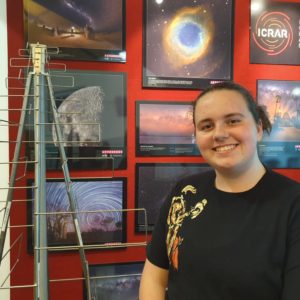 The ICRAR work experience program runs over five days and two campuses, many of the PhD students, professors and staff at ICRAR give us an insight into their everyday lives and how the centre works as a community. On Monday five of us showed up at the Curtin campus and got introduced to Kat and Pikky, they were two postgrad students who would be working with us for the days at Curtin. After a brief overview of ICRAR and where everything was, we talked to Sammy who is studying pulsars. Ronniy gave us a ‘short’ summary of the universe and everything from the big bang to the Square Kilometre Array. He helped us understand the need for analysis of radio waves like they do at ICRAR. We sat in on some weekly meetings that the whole department has, this included an 18-month review of Torrance’s PhD and a coding meeting called standard error. The final part of this day was spent with Arash who is an observational astrophysicist. He worked with us through the problem of a star that changed brightness periodically. At the end of the first day, we were all tired from the absorption of information but ready for another day of fun-packed activities.
The ICRAR work experience program runs over five days and two campuses, many of the PhD students, professors and staff at ICRAR give us an insight into their everyday lives and how the centre works as a community. On Monday five of us showed up at the Curtin campus and got introduced to Kat and Pikky, they were two postgrad students who would be working with us for the days at Curtin. After a brief overview of ICRAR and where everything was, we talked to Sammy who is studying pulsars. Ronniy gave us a ‘short’ summary of the universe and everything from the big bang to the Square Kilometre Array. He helped us understand the need for analysis of radio waves like they do at ICRAR. We sat in on some weekly meetings that the whole department has, this included an 18-month review of Torrance’s PhD and a coding meeting called standard error. The final part of this day was spent with Arash who is an observational astrophysicist. He worked with us through the problem of a star that changed brightness periodically. At the end of the first day, we were all tired from the absorption of information but ready for another day of fun-packed activities.
Tuesday arrived and we finally met the famous Greg at the UWA ICRAR. Cass and Greg showed us around the three-story building that we would spend two of the days in. The highlight of the day (at least for Marcus) was talking to Dan who is a Swiss astrophysicist who taught us about dark matter and black holes, his job was to simulate what they would do in certain scenarios. The weekly meeting that is held at UWA is called journal club; this is where they get together (while eating pizza) to discuss an article that was found during the week. This is a good way for everyone to work collaboratively and gain knowledge from each other. Kevin talked to us about the creation of ICRAR and some history about radio astronomy.
Wednesday was back at the Curtin campus with Kat and Pikky, throughout the day we discussed many career pathways, what people have done and what they plan to do after their work with ICRAR. This helped us get a feel for what options we have and to know what we can realistically aim for. Our assignment for the day was to go through videos that were taken with the Murchison Widefield Array that had satellites in them, we were identifying which satellite was seen in the video. This is essential in order to always know where the satellites are and in order to prevent collisions. Ben and James introduced us to radio galaxies and how they produce jets. Pikky explained to us the creation and composition of black holes, this was really cool and helped us get a good picture in our heads about what this looks like.
On Thursday we met some of the engineers who work very passionately on the telescopes and all of the difficulties that may arise. The Epoch of Reionisation was a very hot topic for the day and when meeting so many students and staff studying this and realising that no one has been able to take a picture of it yet is a truly daunting thing. The fact that this was so many millions of years ago, but it can still be investigated is so exciting. We learnt that ‘noise’ is the downfall to many PhDs, both in our own galaxy and outside due to the effect that it has on the gathering of information. After all this time Kat disclosed what her PhD was on and how she studied the nature of MHz peaked spectrum sources. We met Clancy who gave us an overview and simplification on what we had learnt throughout the week, he managed to answer a lot of our questions and explain the research that he does.
The final day had arrived, and we were all astonished at how short a week seems when everything was fun. We were back at UWA for an eventful day. We did many things over the course of the day including, the SPIRIT telescopes that were on the top of the physics buildings and we got to go inside and look at how the university students use them. Robin introduced us to the Plot of the Week and how to weigh a galaxy. Over the week all five of us got to learn lots and hear stories from people that our peers would never have known about. This work experience was so much fun and really beneficial. I would highly recommend it to any of you looking for a week of interesting things